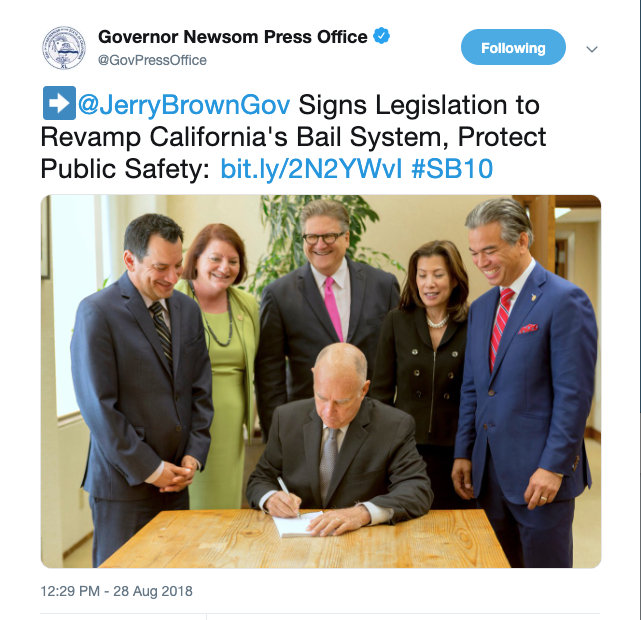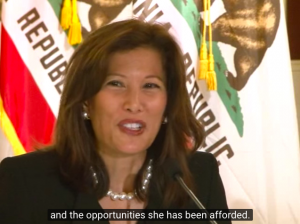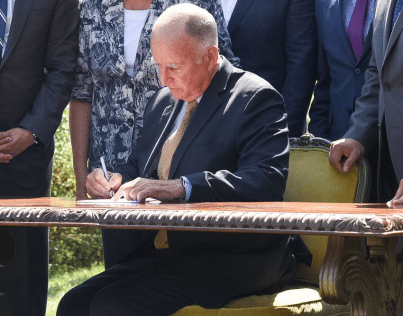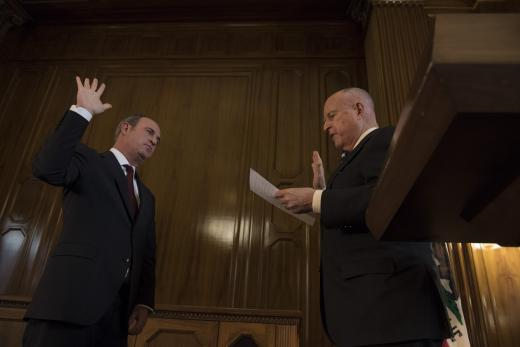
Then Governor Jerry Brown, signs bill.
California Supreme Court Is Implementing Bail Reform Act Prior to 2020 Ballot Initiative
Senate Bill 10 to eliminate the cash bail system is on the 2020 ballot but is already being enacted along with dubious algorithm
By Katy Grimes, August 29, 2019 7:45 am
The California Supreme Court has already started to implement the policies of Senate Bill 10, The California Bail Reform Act, which would have taken effect on Oct. 1, 2019, and eliminates the cash bail system. But they jumped the gun.
SB 10 by Sen. Bob Hertzberg (D-Los Angeles) and Assemblyman Rob Bonta (D-Oakland), would eliminate bail, which bail bondsmen and attorneys say is a vital tool that ensures people arrested for crimes will return to court for their trials, California Globe reported in April. SB 10 will “increase crime and cost the public untold hundreds of millions of dollars,” Jeff Adachi, San Francisco Public Defender said in support of the ballot initiative, before he recently and suddenly passed away.
Former Gov. Jerry Brown signed Senate Bill 10 into law in August 2018. However, Before SB 10 could have gone into effect, Californians Against the Reckless Bail Scheme fought the legislation on two points: it would result in the release of violent offenders to the streets and would kill a $2-billion national industry, as well as the 3,200 bail agents in California. The group collected more than 575,000 signatures in 70 days to put SB 10 on the November 2020 ballot, to allow California voters to decide.
This is why it is important to question why the California Supreme Court already began implementing the policies of SB10, prior to a vote of the California electorate. And according to the American Bail Coalition, they are using $68 million dollars of taxpayer money to implement this.

In January, Chief Justice Tani Cantil-Sakauye announced a new work group to review progress on reforms to California’s system of pretrial detention and identify next steps to continue work on the issue.
“Across California and the nation, pretrial release and detention primarily based on cash bail are slowly being replaced with safer and fairer alternatives. In California, we are leading and experiencing reforms driven by best practices, but also pilot projects, court decisions, and legislation,” Chief Justice Cantil-Sakauye said. “This work group will help continue progress toward reform that benefits the branch, enhances public safety and promotes equitable treatment of all who come through our criminal justice system.”
It is as though the ballot initiative for SB 10 never occurred. What is it they are implementing?
California is testing out a system funded by the Laura and John Arnold Foundation, where bail is eliminated for so-called “low-level offenses.” In numerous California cities, a mathematical algorithm is to be used instead of using a judge. The Laura and John Arnold Foundation is testing this algorithmic pretrial risk assessment tool in 40 jurisdictions across the country.
However, California Globe has seen evidence of some of the “low level” offenders being let out on their own recognizance, with cases dismissed prior even to arraignment in front of a judge, and these do no appear to be “low level” offenders or “low level” crimes.
Here are a few examples of crimes committed by “low level” offenders in California, released under the pretrial risk assessment program. They were let out before seeing a judge, and before bail could be assigned:
- Illegal possession and transporting a machine gun
- Machine gun conversion
- Possession of a silencer
- Transportation of assault weapon
- Manufacture of an unsafe handgun
- Large capacity magazine activity
- Possession of a deadly weapon: short barrel rifle/shotgun
- Forcible rape
- Sodomy by use of force
- Lewd Act upon a child
- Human trafficking
- Sexual penetration with a foreign object
- Intent to transmit sexually transmitted disease
- Kidnapping
- Stalking
- False imprisonment
- Contributing to the delinquency of a minor
The American Bail Coalition says the California Legislature and Gov. Jerry Brown knew that these risk assessments were flawed when they passed SB 10, but then immediately followed it up with this pretrial funding request in the budget. They were well aware of the flaws because the Leadership Conference on Civil Rights in the summer of 2018 came out against these risk assessments, as did over 50 civil rights groups in California.
The American Bail Coalition reports:
“Both the California Judicial Council and the Los Angeles County Board of Supervisors received letters on July 17, 2019 from 27 prominent academics from coast-to-coast that instructed them to stop the pretrial risk assessment movement. What did they do? Ignore it. The shared statement was devastating to the risk assessment ‘computer will fix everything’ movement.”
The The Judicial Council is the policymaking body of the California courts, and under the leadership of the Chief Justice Tani Cantil-Sakauye, and approved $68 million to fund pilot projects in 16 trial courts aimed at releasing more arrestees from jail while they await trial, Courthouse News recently reported.
The courts selected are in Alameda, Los Angeles, Sacramento, San Mateo, Santa Barbara, Sonoma, Tulare, Ventura, Kings, Napa, Sierra, Yuba, Nevada-Sierra, Tuolumne, Modoc and Calaveras counties.

“In early 2015, San Francisco began the process of assessing readiness and implementing the Arnold Foundation’s Public Safety Assessment (PSA), a risk tool that promotes safety, equity, and justice, in consultation with Justice System Partners,” the SF Pretrial group reported. “As the agency providing court and criminal history summaries, SF Pretrial was identified as a lead stakeholder in the implementation process. The PSA Working Group was established in August 2015 and consists of partners from the Sheriff’s Department, Superior Court, SF Pretrial, District Attorney’s Office, Public Defender’s Office, SF Criminal Conflicts Panel, and SF Reentry Council/Division of Adult Probation Department. The Working Group reviewed and advised on the timeline; provided input into the California PSA Violent Offenses List; and developed the Decision Making Framework, Court Report Template, Quality Assurance and Outcome Measures. The PSA Working Group continues to meet on a quarterly basis. All materials developed by the PSA Working Group are maintained by SF Pretrial.”
“In San Francisco, an individual who was on felony probation, had been re-arrested, then released pretrial based on a judge’s discernment after evaluating the Arnold tool, later killed a 71-year-old man,” Inside Sources reported. “More than a third of those released in San Francisco as a result of the assessment were either booked on a new offense or failed to appear, according to a study.”
Other critics of SB 10 say the Arnold Foundation actually helped write the bill and claim only the foundation’s Public Safety Assessment fits the bill’s requirements.
“According to the text of the legislation, only his foundation’s system would meet the requirements of the bill,” a National Public Pension Coalition blog post claims. “SB 10 would essentially award the Laura and John Arnold Foundation a contract worth tens of millions of dollars a year to implement their system in California. How convenient for the Arnold Foundation that their proposed system is the only one that works according to the proposed legislation they helped to write!”
The other concern is that the data going into the algorithm tool is skewed to accommodate the concern that more people of color are “wrongfully convicted” of crimes.
- New BLS Data Shows Union Membership Drives Falling Flat - February 19, 2026
- NY Federal Reserve Tariff Report an ‘Embarrassment’ - February 19, 2026
- Legislation Would Conceal California High-Speed Rail Records from Public - February 18, 2026





Victims of this travesty should then band together and sue the state for billions when the poor unfortunate criminals who had a bad childhood go back to theiving and killing. The democrat party has opened the jails up and defied federal laws on illegal aliens and are implementing Open Borders. There should be severe financial penalties against the state government for abandoning their basic duty to the people.
John, I’m with you all the way, but I would like to further ask WHAT the hell is going on here? Because I distinctly remember being assured by all authorities that once the signatures were successfully gathered to put this on the ballot for voters to decide, the October 2019 implementation date — and thus by definition any other arbitrary implementation date — would longer apply. Also, as I recall, the organization gathering signatures reached the goal in record time so as to assure that it would appear on the 2020 ballot. Does anyone else remember this?
You are 100% correct. The referendum froze SB10 in it’s tracks until 2020, but I guess Sakayue didn’t get the message, or she just doesn’t care. Why isn’t our AG filing an injunction to this? How is it that they can go against a legally filed referendum, and do whatever they damn well please?? Something is very fishy here. She needs to be called out.
Just another example of our elected officials disregarding the will of the people. They seem to think that they know whats best for us, regardless if we tell them they don’t. This is just like Gavin Newsom deciding he is not going to utilize the death penalty anymore because he thinks its wrong. Meanwhile Californians have voted to keep the death penalty 11 times in the past several decades. The job of our elected officials is to represent the people and to keep our communities safe. They are accomplishing neither. It is time for a BIG change in California. We need to swing the pendulum back and get tough on crime. We have to stop coddling the criminals like they are victims and focus on protecting the communities we live in.
Bonasera is a proud Italian-American undertaker who tends to keep away from the Corleone family, knowing they are involved with the Mafia, though Don Corleone’s wife is a godmother to Bonasera’s daughter. His daughter is brutally beaten by her boyfriend and his friend for refusing to have sex after they had plied her with whiskey. The men escape any serious penalty.
Desperate, Bonasera decides to go to Don Corleone on the day of his daughter’s wedding to ask him to kill the young men; according to tradition, a Sicilian never refuses a favor on the day of his daughter’s wedding. His proposition angers Don Corleone, who reprimands him for asking for a favor without showing the proper respect, and for seeking the attackers’ deaths when his daughter was alive and would recover. Nevertheless, Vito agrees to grant a favor in return for Bonasera’s “friendship” and the respectful address of “Godfather”. Vito Corleone also gently reprimands Bonasera for attempting to seek justice through the courts instead of coming to him first.
Now victims of any of these types of rape will walk free to repeat their actions. Sad day for the justice system in this country. They are setting the Culture in this country back decades. Women, children will now have to be afraid ever more than they already are every day of their lives.
Forcible rape
Sodomy by use of force
Lewd Act upon a child
Human trafficking
Sexual penetration with a foreign object
Intent to transmit sexually transmitted disease
Kidnapping
Stalking
False imprisonment
California seems like a great place for a “crime-vacation”. Even if you get caught you have more rights than the residents, and eventually you’ll be allowed to walk free. SF may even name a street after you.
Lets have those criminals who have been released on the “pretrial assessment program” go to those politicians neighborhoods and cause injury to their family and see if those criminals get out on a “pretrial assessment ” program. And what is going to happen to those habitual offenders once they commit another crime while being out on the “pretrial assessment program”? How will that algorhythm view that person on the second charges or even the third charges?
To everyone coming from the, “we need to be tough[er] on crime” perspective, can we please not lose sight of that fact that in discussing bail reform, we are SOLELY discussing people who are ACCUSED and NOT YET CONVICTED. In this country, one is supposed to be assumed to be innocent unless and until they plead guilty or are until found guilty at trial. Please stop acting as though everyone arrested or accused IS guilty. Crime happens, and some people let out do recidivate, but unless we incarcerate everyone accused of crime and abolish our principle of “Innocent Until Proven Guilty”, such will always occur in some amount. If we amp up “tough on crime” every time crime occurs, where does it end? Do people understand/appreciate the fact that merely filing criminal charges (i.e. accusing a person) does not involve presenting evidence to a court? That comes much much later (if at all). SB10 is a bad step because it prevents many ACCUSED individuals from being released AT ALL pre-arraignment (e.g. Domestic Violence, DUI with Injury, DUI with 0.20 BAC or above, all 290 registrants, and many more). It furthermore creates a very strong presumption of remand in many felony cases which would otherwise be permitted to bail.
What works better than ELIMINATING bail, is eliminating the practice of setting bail at amounts 10x higher than what people can afford. Then, defendants won’t need bail companies, AND they will have the incentive to behave because THEY WOULD GET THEIR MONEY BACK as long as they abide by all pretrial release conditions. The incentive to behave whilst on bail, with a bail company, is too vague/abstract/non-existent to properly deter defendant pretrial misbehavior because the defendant knows he is NEVER GETTING THAT MONEY BACK already.
I am a criminal defense attorney, and I strongly oppose SB10. It will only lead us further towards a complete millitary/totalitarianistic/guilty-until-proven-innocent/police State.
I think, besides the bleeding hearts on crime, yours notwithstanding, that an algorithm is partly the problem. Judges are worked, no doubt, however it is plain to see that when 1/3 recommit we have a problem. Then as one here asked ‘what does the algorithm do with Offenses 2 and 3? ‘ Best people stay out of trouble first then stand before a judge who placed the masses ahead of the criminal… no matter how so-called. Our streets are teeming with people who need to be forced to wear a Red A on their back. I for one and as a Native realize our system is Shanghaied. Those who can’t see either should not be in charge of anything or should be charged with living on the street for one month to do a personal study. Ivory Tower inhabitants are ruining this fair State; or so it once was.
Place SB10 on the ballot and let our residents decide. People are wise to this and as well are fully sick of those who ignore laws, place the public in jeopardy and ruin our lives in what has been a beautiful and relatively peaceful place to live and raise our family. I call for CA Governmental reform.
Ryan L Smith: You are exactly right. Much of this issue regarding excessive fines and fees applies to simple traffic infractions. The add-on fee system currently in place causes a $70 speeding infraction to immediately balloon to more than $400. It’s a taxation avoidance scheme intended as an alternative revenue generating tool to fund city, county, and state general funds. It charges fees for services that traffic offenders never requested, didn’t use, didn’t benefit from, nor caused to be necessary. None of add-on services have anything to do with improving traffic or public safety – except for one, the California Driver’s Education fee. Yes! Our court systems still collect fees for the high school driver’s education program fund that years ago, parents were told was no longer available, shifting costs and responsibilities for children’s driver education to their parents. Imagine a parent receiving a traffic citation. On paying the assessed fine, they are actually paying twice to fund their child’s driver education – only in this case, they receive nothing in return. Mac Taylor, former legislative analyst, in his 2016 report on traffic add-on fees found legislative requirements to account for collected add-on fees was so poorly managed by California courts, “No one knows how much is coming in, and no one knows where any of it goes.” Before they terminated revocation of driver’s licenses for failure to pay traffic fines and add-on fees, people unable to pay lost their licenses and then their jobs, and were forced onto welfare programs to feed their families. California eventually wised up to the fact that this punitive approach did more harm than good. Other indicators show the same thing. You may notice every 3 years, someone in Sacramento hops on a political stump announcing a “one-time amnesty” for traffic offenders, allowing them to barter for pennies on the dollar to pay their overdue traffic fines. It’s always touted as a measure taken out of concern for disenfranchised California drivers who deserve a break. In reality, the collection costs for unpaid fines hits a point of diminishing returns, where collection costs grow higher than the revenue they bring in, parallel to the accumulating number of non-collectible accounts on their books. The “one-time amnesty” is the only way to clear their traffic fine accounts receivable of these costly non-collectible outstanding fines and add-on fees. I’m no accountant, but that this issue rises as a problem at all, seems a red flag that something is wrong with the design of this revenue generating scheme. Or, it could be, that turning our state’s judicial system into a collection agency for the state, really isn’t a great idea. Again, I’m no expert, but it doesn’t appear our judicial system was designed to fulfill this task, which may be why it’s not working out very well – on many planes, with rights to a neutral forum being only one aspect it’s negatively influenced (add on fees also fund judge’s salaries, court room expenses, etc. – “operating costs” and the like).